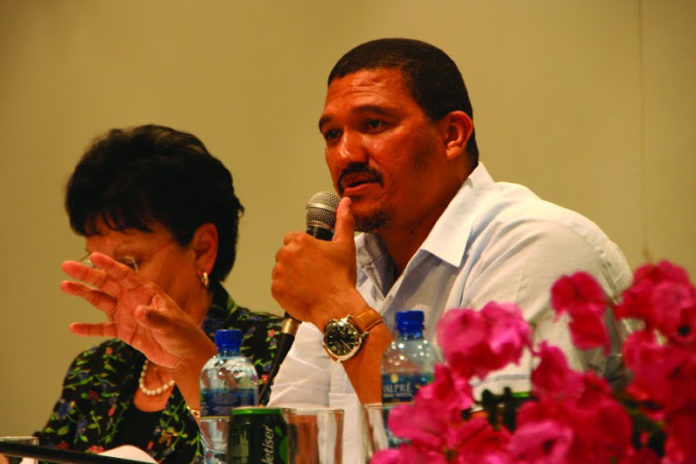 |
The Cape South African Jewish Board of Deputies recently hosted a ground-breaking community meeting with Western Cape ANC Chairman and Deputy Minister of International Relations Marius Fransman.
The gathering was part of the Cape Board’s new ‘Straight Talking’ series, which hosts public figures from across the spectrum to engage with the Cape Town Jewish community on a range of issues. The meeting with Deputy Minister Fransman certainly reflected these aims. It began with the lighting of the Chanukah candles, where Rabbi Feldman explained that Chanukah emphasises that we share our ‘light’ with others, and that we recognise this ‘spark of light’ within everyone.”
This message was continued in an introduction by Cape Board Chairman Li Boiskin, who explained the context of how this meeting came about. She said that the SAJBD engages with many organisations with the aim of furthering understanding and identifying ways in which the community can play a meaningful role in the country. In this context, they felt a need to engage with Deputy Minister Fransman, especially in light of his statements to the Cape Muslim community, which was singled out as a ‘key interest group’. However, the Jewish community felt marginalised as it sees itself as an equal stakeholder in the interests of the Cape.
Finding common ground
The result was the ‘Straight Talking’ meeting, where Fransman was asked to address topics ranging from ‘Marikana to Mangaung’ and issues pertaining to the Jewish community. The Deputy Minister began by emphasising the importance of the meeting, especially on the eve of the Mangaung conference. In this context, he emphasised that that as the political party in power, “everything the movement does has an impact on the mood of society.”
He said that one crucial aspect of this is to engage directly with minorities. Referring to the role that Jews played in building a democratic South Africa, Fransman said that the community should receive recognition and engagement. “The community may be small, but it has delivered leaders in every sector of society,” he said. In turn, the Deputy Minister emphasised that “Democracy is not a once-off event when we go to the polls. It is an on-going process.” He assured the community that they will always have a platform to engage.
The Deputy Minister said that “we don’t have to agree on everything, but must aim to find common ground”. In this context, he said that the tension and anxiety that the community felt regarding the ANC’s approach to Israel “need not be”. He acknowledged that what happens in the Israeli-Palestinian conflict is certainly felt in Cape Town. Fransman therefore proposed that perhaps dialogue could begin with discussing local issues and build up to talking about this complex international conflict. “Our history of fighting apartheid and creating reconciliation must be our point of departure. I know we cannot change any minds, but we must focus on what holds us together. Let us lay the foundation for action and engagement”.
Urgent need for discussion
Following his address, community members posed questions tothe Deputy Minister, moderated aptly by HCI CEO and former ANC MP Johnny Copelyn. Issues raised included the Israeli-Palestinian conflict, the South African government’s inaction in assisting Dr Cyril Karabus, BDS proposals at Mangaung and requests for more intensive dialogue.
Tension did arise when Fransman failed to fully address some of these concerns. He could not supply an adequate answer as to why the government had not assisted Karabus, and he contradicted previous recorded statements he made regarding Israel, labelling and the ‘travel ban’.
One particularly tense moment was when Fransman said that “I met your Vice Minister in Israel”, indicating that he possibly saw the community as being loyal only to the Jewish state. Fransman also said that Israeli settlements were the biggest obstacle to peace, not acknowledging the two-sided nature of the conflict or explaining the ANC’s silence regarding Hamas’ actions. He added that in the eyes of the ANC’s top leadership, the Jewish community sometimes seems to be representing the Israeli government’s viewpoint more than a South African perspective, which they found alienating.
These honest and challenging exchanges demonstrate the difficulties of such engagements, where a community’s sensitivities may not always be fully understood, or where parties are coming from very different perspectives. This shows the urgent need for such discussions to take place, no matter how challenging this may be. In closing, Cape Board Chairman Li Boiskin said: “This kind of engagement is exactly what we envisioned with our ‘Straight Talking’ series, where we are prepared to engage and ask difficult questions. Don’t ever hold back on debate and asking challenging questions — this is what moves us forward.”










